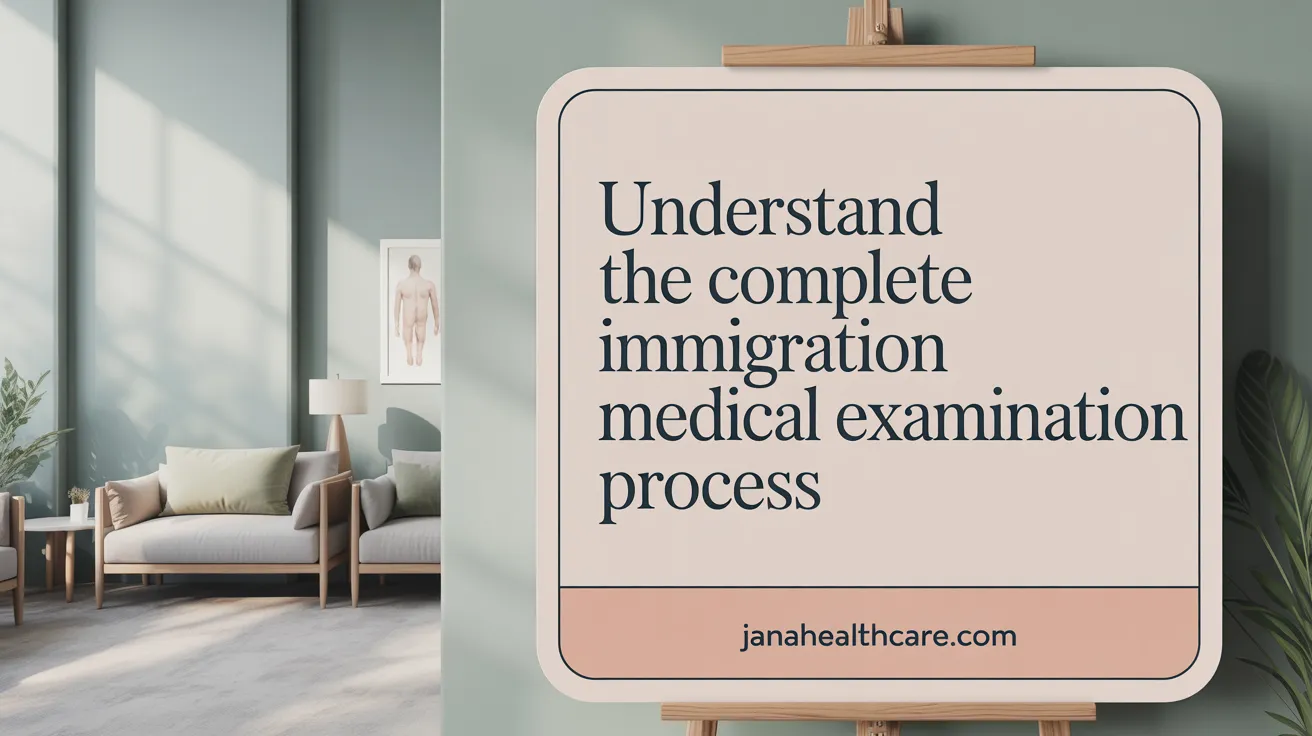Introduction to the Immigration Medical Exam
Preparing for your immigration medical exam is a critical step in the journey toward lawful permanent residency in the United States. This comprehensive guide offers step-by-step tips and important information to help you understand what to expect, how to prepare, and how to ensure a smooth and successful medical examination process. From documentation and vaccinations to the role of civil surgeons and required testing, we've gathered key insights to assist applicants in meeting all necessary health requirements efficiently and confidently.
Step-by-Step Preparation for Your Immigration Medical Exam

What is the step-by-step process for preparing for an immigration medical exam?
Preparing thoroughly for your immigration medical exam ensures a smooth process and helps avoid delays in your application. First, gather all relevant medical and vaccination records, including proof of previous immunizations such as Mumps, Measles, Polio, Tetanus, Diphtheria, Rubella, and Pertussis. These records are crucial for verifying your vaccination status and determining if additional vaccines are needed (Vaccination requirements for immigrants, Vaccination records for immigration).
Next, schedule an appointment with a USCIS-approved civil surgeon or panel physician. It’s important to choose a reputable, conveniently located provider who is authorized to perform immigration exams and will report results through the CDC’s eMedical system (Civil Surgeon for Immigration, Schedule medical examination with panel physician).
Before the exam, review the list of required vaccinations and health documentation. If you lack certain immunizations, inform the doctor during the appointment; they can administer missing vaccines or help obtain waivers for medical or religious reasons (Vaccination requirements and waivers, Medical exemptions and waivers). Also, prepare your medical history, including any previous diagnoses of tuberculosis, syphilis, or other medical conditions, along with certificates of treatment if applicable (Medical history review, Medical documentation for psychiatric history).
During the exam, be prepared for screenings like blood tests for syphilis and gonorrhea, and a chest X-ray if you are over 15 or required by your state or country’s guidelines. Pregnant women should communicate if an X-ray is necessary, so safeguards such as lead shielding can be used, or the X-ray can be postponed if possible (Chest X-ray and blood tests, Chest X-ray consent for pregnant women).
Bring a government-issued photo ID and a list of current medications to your appointment (Photo ID and appointment letter, What to bring to USCIS medical exam). It’s also helpful to have your completed Form I-693 handy, but do not sign it before the doctor witnesses your signature. The civil surgeon will complete and seal the form in an envelope necessary for your green card application (Form I-693 and medical exam process, Form I-693 instructions).
After the exam, make sure the sealed envelope with your Form I-693 is correctly submitted to USCIS along with your application. Also, verify that the exam was completed on or after the date the civil surgeon signed it, to ensure its validity during the application process (Submit Form I-693 with Form I-485, Medical exam result submission process). Proper preparation helps facilitate a smooth and successful immigration health screening.
Documents, Medical Records, and Vaccination Requirements

What documents and preparations are needed for the immigration medical exam?
Applicants should bring a valid government-issued photo ID, their appointment notice, and any relevant vaccination records or medical reports that detail their medical history. During the exam, they will undergo physical and mental health assessments, along with blood and urine tests for infectious diseases like tuberculosis, syphilis, and gonorrhea. It is crucial to provide proof of required vaccinations according to CDC guidelines. The medical examination must be conducted by a USCIS-approved civil surgeon or designated panel physician.
Disclosing any existing health conditions, current medications, or prior treatments is vital during the exam. If applicable, certificates documenting past treatments—such as for TB or syphilis—should be brought along. Once the exam is complete, the civil surgeon will give the applicant a sealed Form I-693, which must be submitted to USCIS as part of the immigration application.
What to Expect During Your Immigration Medical Examination

What can applicants expect during the immigration medical exam?
Applicants can anticipate a thorough health assessment by a government-authorized doctor, often called a civil surgeon for immigration. The exam begins with a review of medical history and current health status, followed by a physical and mental health evaluation. The physician conducts tests for infectious diseases like tuberculosis, syphilis, and gonorrhea. The total duration of the exam is usually around two hours.
During the visit, blood tests and chest X-rays are performed if indicated — for example, TB screening involves either a skin or blood test, with a chest X-ray required if the initial test is positive. Vaccination status is reviewed, and necessary vaccines are administered during the appointment, ensuring compliance with CDC guidelines.
Applicants must bring identification, previous vaccination records, and relevant medical certificates. Pregnant women can delay chest X-rays by providing consent and following safety measures. At the end of the exam, the physician completes Form I-693, which documents the results. This sealed form is submitted with the immigration application to prove the applicant meets health standards.
What tests and screenings are commonly required during the immigration medical exam?
The medical screening includes a physical checkup, assessment of medical history, and specific tests for diseases and conditions relevant to U.S. immigration law. These typically involve:
- Tuberculosis (TB) testing: A TB skin or blood test, with a chest X-ray if the test is positive.
- Syphilis testing: Blood tests like RPR or VDRL, required for applicants aged 18-44. See detailed test requirements.
- Gonorrhea testing: Urine or swab tests for applicants aged 18-24.
- Blood and urine tests: These screen for infectious diseases such as gonorrhea and syphilis.
- Vaccination assessment: Verification of immunization records to CDC requirements, including vaccines for Measles, Mumps, Rubella, Varicella, Hepatitis A and B, Influenza, Tdap, and others. Refer to vaccination requirements for immigration.
- Mental health evaluation: An assessment of behavioral health, especially if there is a history of mental health or harmful behavior, as outlined in mental health evaluations.
Special protocols are in place for pregnant women, including postponement of chest X-rays with consent and protective shielding to ensure safety.
How to prepare for your exam
Applicants should gather all relevant health documents, including vaccination records and prior certificates for diseases like TB and syphilis. Arriving with a list of current medications and identification helps streamline the process. Refraining from signing the I-693 form before the appointment is recommended, as the civil surgeon needs to witness signing on-site.
Choosing an authorized provider, such as a USCIS-designated civil surgeon, ensures compliance with federal regulations. The complete process results in a sealed Form I-693, which is essential for finalizing the immigration application. Proper preparation and understanding of the exam contents facilitate a smoother experience, helping applicants to meet new immigration health standards efficiently.
Ensuring a Smooth and Successful Immigration Medical Exam

Scheduling and appointment tips
To guarantee an efficient process, schedule your immigration medical exam well in advance of your visa interview or green card application deadline. Choose a government-approved civil surgeon or panel physician experienced in immigration examinations. Confirm all necessary documents are prepared, including your vaccination records, medical history, and photo ID. If you are pregnant or have specific health concerns, inform your provider ahead of time to coordinate special procedures, like postponing X-rays with consent. Timing your appointment appropriately ensures that results remain valid and reduces the need for follow-up visits. For more tips, see Scheduling a medical examination with panel physician.
Documents and form preparation, especially Form I-693
Prepare all required documents before your exam day. This includes your passport or ID, vaccination records, and any certificates for previous treatment of diseases such as tuberculosis or syphilis. For U.S.-based applicants, complete the relevant parts of Form I-693 beforehand but avoid signing it until your civil surgeon witnesses your signature during the appointment. The form should be signed, dated, and sealed in the envelope provided by the civil surgeon, as an unsigned or unsealed form might lead to rejection. Refer to the Form I-693 instructions and submission guidelines for detailed requirements and best practices.
Communication assistance including translators
If English isn't your first language or you have difficulty understanding medical terminology, consider bringing a translator with you. Clear communication during the exam helps ensure your medical history is accurately conveyed and that you understand any instructions or additional tests required. This proactive step reduces misunderstandings and promotes a smoother process. For more tips, see Immigration medical exam tips including bringing a translator.
Health disclosure and honesty during the exam
Be honest and thorough when discussing your medical history, current medications, and any past health conditions. Providing truthful information about treatments for chronic illnesses, mental health, or infectious diseases is vital. Attempting to hide or omit relevant details can lead to delays, additional testing, or denial of your application. Remember, the exam and documentation are confidential and intended solely for immigration health screening. Learn more about medical history review and health disclosure.
Handling post-exam procedures and form submission
After your exam, the civil surgeon will place the sealed Form I-693 in an envelope for your submission. Keep this envelope sealed until it is handed over to USCIS. If applying from within the U.S., submit the form along with your I-485 application before the deadline, as recent updates now require its timely inclusion. If abroad, submit the sealed exam results at your visa interview or as directed by the embassy. Properly stored, the form remains valid for two years, providing flexibility if there are delays. For details on submission of sealed Form I-693 and medical exam result processes and guidance on exam result handling and submission to embassy or USCIS.
Following CDC instructions to avoid application delays
Stay informed about vaccination requirements and disease screening protocols by reviewing CDC guidelines for immigration medical exams. This reduces the risk of missing necessary vaccines or tests, which can cause delays or rejections. Ensure that coverage of diseases such as measles, mumps, rubella, and other recommended vaccines is up-to-date. If medical or religious reasons prevent vaccination, prepare to file relevant waiver requests as part of your application process. Meticulous adherence to CDC instructions and USCIS vaccination requirements and USCIS guidelines for vaccine waivers facilitate a trouble-free application review.
Understanding the Role of Civil Surgeons and the Medical Examination Process Overview

What is the role of civil surgeons in the immigration medical examination process?
Civil surgeons are designated medical professionals authorized by USCIS (U.S. Citizenship and Immigration Services) to conduct immigration medical examinations within the United States. They perform essential health evaluations, including physical and mental health assessments, screening for infectious diseases like tuberculosis and syphilis, and reviewing the applicant’s vaccination records.
Civil surgeons are responsible for completing and signing Form I-693, Report of Immigration Medical Examination and Vaccination Record, which is a crucial document in the immigration process. They follow CDC guidelines and technical instructions during examinations to ensure compliance with federal health standards. These professionals also submit their findings electronically through USCIS systems such as eMedical electronic health processing, which streamlines the reporting process and maintains public health security.
To verify applicants' identities, civil surgeons must adhere to strict identification procedures. They ensure all results are properly recorded and sealed in a tamper-proof envelope, which applicants must submit without opening when applying for adjustment of status. Their role is vital in ensuring that applicants are not inadmissible on health-related grounds, thereby supporting the integrity of the immigration process. Learn more about the role of civil surgeons and immigration medical exam requirements.
Use of USCIS systems and CDC technical guidelines
Civil surgeons utilize USCIS’s eMedical electronic health processing system to report examination results efficiently. This technology enhances data accuracy and facilitates verification by immigration authorities.
They also follow the CDC’s Technical Instructions for Civil Surgeons, which outline specific procedures for disease screening, vaccination assessment, and handling special cases like pregnancy or medical exemptions. These guidelines ensure examinations are standardized, comprehensive, and uphold public health safety.
Form I-693 completion, validity, and submission
The Form I-693 must be completed by a USCIS-approved civil surgeon, signed, and sealed in a designated envelope. The form documents the applicant’s health status, vaccination history, and screening results.
It is important that the form is signed and submitted within its validity period—generally two years from the date the civil surgeon signs it—and only on or after the date specified on the form. An unsigned or improperly completed form can result in rejection or delays.
Applicants must include the sealed Form I-693 with their immigration application, such as Form I-485. The form remains valid for specific periods unless additional assessments are required due to changes in health status. See the USCIS Form I-693 submission guidelines for details.
Medical examination objectives and public health focus
The primary goals of the immigration medical exam are to detect and prevent the entry of applicants with infectious diseases or other health conditions that could pose a public health risk. The exam screens for diseases like tuberculosis, syphilis, and gonorrhea, and verifies that vaccination requirements are met.
This process helps uphold public health standards and ensures that individuals entering the U.S. do not threaten the health of the general population. It also assesses whether individuals have untreated or active infectious diseases that may lead to inadmissibility. Detailed information on medical examination requirements and procedures is available.
Health-related grounds for inadmissibility and waivers
Applicants found to have active, communicable diseases or who lack required vaccinations may be deemed inadmissible on health grounds. However, waivers can be available for certain conditions, especially if the applicant can demonstrate treatment or management of illness.
For instance, applicants with a history of mental health issues, substance abuse, or chronic medical conditions can often present certified treatment or prognosis documents. These documents are reviewed to determine whether they qualify for waivers, allowing them to overcome health-related inadmissibility. More about health-related inadmissibility and waivers can be found online.
Overview of the adjustment of status medical exam process
The process begins with scheduling an appointment with a USCIS-approved civil surgeon. Applicants should gather medical history, vaccination records, and identification documents.
During the exam, the civil surgeon reviews medical and vaccination history, performs physical and mental health evaluations, and conducts tests for infectious diseases. Once completed, the surgeon signs and seals the Form I-693.
The sealed form is then submitted along with the application for adjustment of status (Form I-485). Ensuring proper completion and timely submission of Form I-693 is crucial, as mistakes or delays can impact the approval process.
This comprehensive health assessment helps USCIS determine admissibility and ensures only applicants who meet U.S. public health standards are granted permanent residence status. For a step-by-step guide on the adjustment of status medical exam process, visit the linked resource.
More information can be found by searching for: Role of civil surgeons and immigration medical exam overview.
This overview provides essential knowledge about how health evaluations support the immigration process, emphasizing the importance of proper procedures, documentation, and compliance with public health standards.
Final Thoughts on Preparing for Your Immigration Medical Exam
Understanding and preparing for your immigration medical exam can be a straightforward process when you know what to expect and how to organize the necessary documents and medical information. Working with authorized civil surgeons, complying with vaccination and screening requirements, and submitting Form I-693 correctly are pivotal steps to avoid delays and ensure your application moves forward smoothly. By following the expert tips and step-by-step guidance provided, you can approach your medical exam confidently, fulfilling this crucial requirement on your path to lawful permanent residency.
